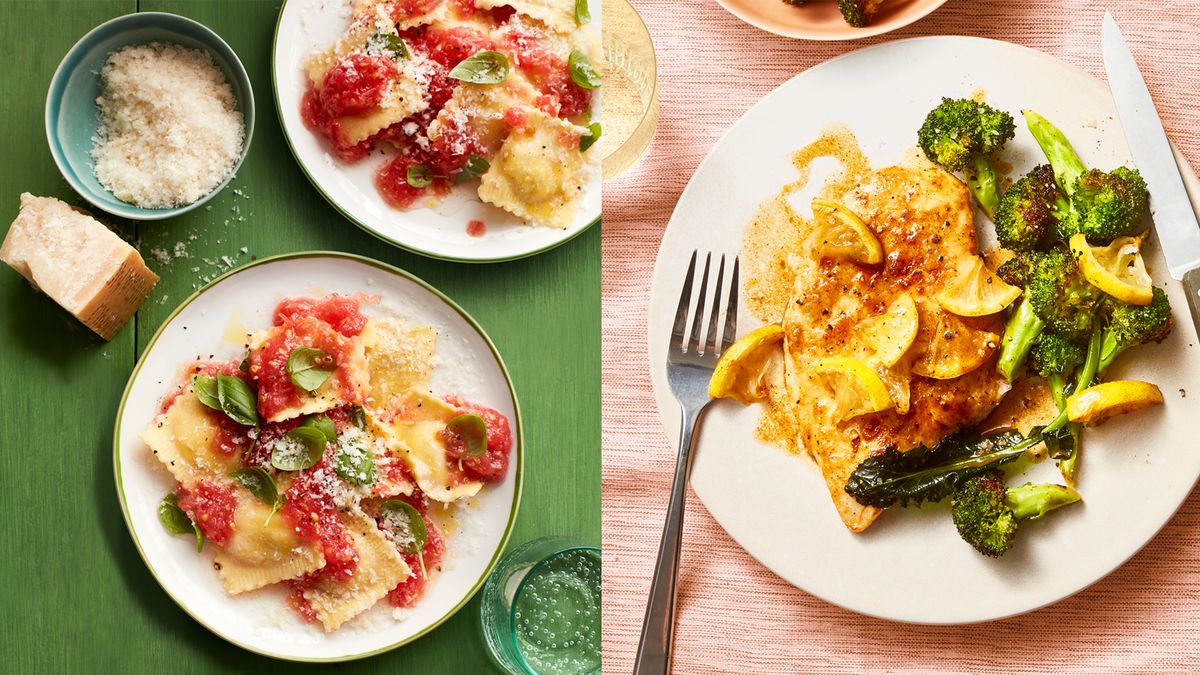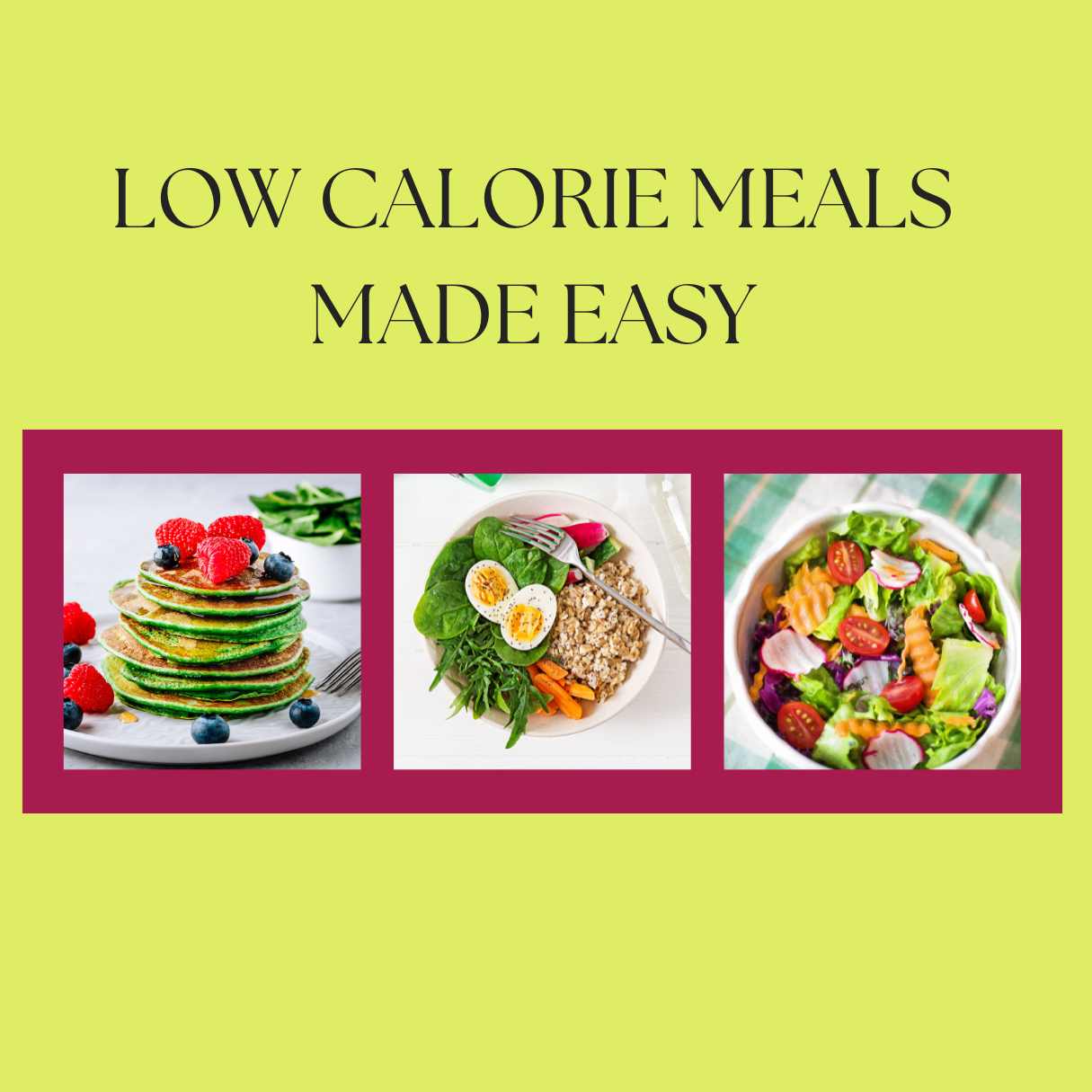Low calorie meals are nutritious food options that contain a reduced amount of calories. These meals are helpful for weight loss and maintaining a healthy lifestyle.
In addition to promoting weight loss, low calorie meals are also known to improve heart health, boost metabolism, and enhance overall well-being. Incorporating a variety of fruits, vegetables, lean proteins, and whole grains into your diet can help you create delicious and satisfying low calorie meals.
By being mindful of portion sizes and making smart ingredient choices, you can enjoy flavorful and filling meals while still keeping your calorie intake in check. With the vast array of low calorie recipes available, it is easy to find meals that will suit your taste preferences and dietary needs.
The Power Of Low Calorie Eating
Discover the power of low calorie meals and unlock the key to maintaining a healthy lifestyle. These nutritious options not only aid weight loss, but also provide essential nutrients for overall well-being. Experience the benefits of low calorie eating today.
Low calorie meals have gained tremendous popularity in recent years, and for good reason. Not only do they help in weight management, but they also offer a multitude of health benefits. By focusing on consuming meals that are low in calories, individuals can effectively shed those extra pounds and improve their overall well-being. In this article, we will explore the benefits of low calorie meals and delve into the science behind losing weight with this approach.
Benefits Of Low Calorie Meals
When it comes to weight loss, low calorie meals have proven to be highly effective. Incorporating these meals into your diet can lead to a variety of benefits, such as:
- Weight management: Low calorie meals help create a calorie deficit, which is essential for shedding unwanted pounds. By consuming fewer calories than you burn, your body turns to stored fat for energy, resulting in weight loss.
- Increased energy: Many low calorie foods are packed with essential nutrients and vitamins, providing your body with the fuel it needs to thrive. This can lead to higher energy levels throughout the day.
- Improved heart health: By adopting a low calorie diet, you can reduce the risk of heart disease and stroke. Consuming fewer calories helps control blood pressure and cholesterol levels, promoting a healthier cardiovascular system.
- Better digestion: Low calorie meals are often rich in fiber, which aids in digestion and promotes a healthy gut. This can help prevent constipation, bloating, and other digestive issues.
The Science Behind Losing Weight With Low Calorie Meals
Understanding the science behind losing weight with low calorie meals is crucial for successful weight management. When you consume a low calorie meal, your body receives fewer calories than it needs to maintain its current weight. As a result, it taps into stored fat reserves to make up the energy deficit.
This process, known as caloric deficit, stimulates the body to burn fat for energy. Over time, consistent consumption of low calorie meals paired with regular physical activity can lead to sustainable weight loss. It’s important to remember that weight loss is a gradual process, and aiming for a safe and steady rate of around 1-2 pounds per week is recommended.
Additionally, low calorie meals tend to be nutrient-dense, meaning they provide a high amount of essential nutrients relative to their calorie content. This ensures that your body receives the necessary vitamins, minerals, and antioxidants while still promoting weight loss. By choosing whole, unprocessed foods and managing portion sizes, you can successfully navigate the world of low calorie eating.
Planning For Success
Planning for success is crucial when it comes to maintaining a low-calorie diet. By setting realistic goals and expectations, creating a meal plan, and developing a grocery list, you can set yourself up for success on your weight loss journey.
Setting Realistic Goals And Expectations
Before embarking on a low-calorie meal plan, it’s important to set realistic goals and expectations for yourself. Trying to lose weight too quickly or setting unrealistic expectations can lead to frustration and disappointment.
- Set achievable weight loss goals that are both healthy and sustainable.
- Keep in mind that losing 1-2 pounds per week is considered a healthy rate of weight loss.
- Focus on small, incremental changes rather than drastic measures.
Creating A Meal Plan
A well-thought-out meal plan is essential for staying on track with your low-calorie diet. By planning your meals in advance, you can ensure that you have healthy and nutritious options readily available, making it easier to stick to your calorie goals.
- Start by determining your daily calorie intake.
- Divide your calories evenly among three main meals and snacks.
- Include a balance of protein, carbohydrates, and healthy fats in each meal.
- Consider incorporating plenty of fruits, vegetables, and whole grains.
- Experiment with different recipes and flavors to keep your meals exciting.
Developing A Grocery List
One of the keys to success for maintaining a low-calorie diet is having the right foods on hand. By developing a grocery list and sticking to it, you can avoid impulse purchases and ensure that you always have nutritious options at your fingertips.
| Protein | Vegetables | Whole Grains | Fruits | Dairy |
|---|---|---|---|---|
| Chicken breast | Spinach | Quinoa | Apples | Greek yogurt |
| Fish | Broccoli | Brown rice | Berries | Cottage cheese |
| Lean beef | Carrots | Oats | Grapes |
- Make a list of the ingredients you need based on your meal plan.
- Stick to the perimeter of the grocery store, where the fresh produce and lean proteins are usually located.
- Avoid purchasing high-calorie, processed foods that can derail your progress.
- Remember to always read nutrition labels and choose options with lower calorie counts.
Power Foods For Low Calorie Meals
Introduction: When it comes to low calorie meals, incorporating power foods can make a significant difference. Power foods are nutrient-dense options that are not only low in calories but also provide a wide range of health benefits.
we will explore the top 4 power foods for weight loss and discuss their nutritional benefits. H3: The Top 4 Power Foods for Weight Loss
1. Avocado: A Superfood for Weight Loss Avocado tops the list of power foods for weight loss. Rich in healthy fats and fiber, this creamy fruit helps to curb hunger and keep you feeling satiated for longer periods. Avocados are also packed with monounsaturated fats that are known to promote heart health.
2. Spinach: A Nutrient Powerhouse Spinach is a highly nutritious and low-calorie leafy green. Packed with vitamins A, C, and K, as well as essential minerals like iron and calcium, it promotes good overall health. Its high fiber content aids digestion and helps to maintain a healthy weight.
3. Quinoa: The Super Grain Quinoa is a complete protein, making it an excellent choice for individuals looking to shed pounds. It contains all nine essential amino acids and is high in fiber, helping to keep you full for longer periods. Quinoa is also a good source of iron, magnesium, and manganese.
4. Greek Yogurt: A Protein-Rich Option Greek yogurt is a great low calorie and high protein alternative to regular yogurt. It contains twice the amount of protein, which helps to build lean muscle mass and boosts metabolism. Rich in probiotics, Greek yogurt promotes a healthy gut and aids digestion. It is also a good source of calcium, potassium, and vitamins B-12 and D.


Credit: www.prevention.com
Easy Low Calorie Meal Recipes
In today’s fast-paced world, it can be challenging to find the time and energy to prepare nutritious meals. However, with these easy low calorie meal recipes, you can enjoy delicious and satisfying dishes without breaking the calorie bank. Whether you’re looking for a healthy breakfast, a quick lunch on the go, a flavorful dinner, or guilt-free snacks and desserts, we’ve got you covered. Let’s dive into these mouthwatering recipes that will keep you feeling satisfied and energized throughout the day.
Breakfast: Healthy And Satisfying Options
Start your day off right with a nutritious and filling breakfast. Here are some easy low calorie meal ideas to kickstart your morning:
- Egg white omelet with spinach, mushrooms, and feta cheese
- Avocado toast with whole grain bread and a sprinkle of chia seeds
- Yogurt parfait with fresh berries and a sprinkle of granola
These options are packed with vitamins, minerals, and protein to keep you feeling full and energized until lunchtime.
Lunch: Quick And Delicious Meals On The Go
For busy days when you’re on the move, these quick and delicious low calorie lunch ideas are perfect:
- Grilled chicken salad with mixed greens, cherry tomatoes, and balsamic vinaigrette
- Vegetable wrap with hummus, spinach, cucumbers, and bell peppers
- Quinoa bowl with roasted vegetables and a drizzle of tahini dressing
These options can be prepared in advance and easily packed for a nutritious meal on the go.
Dinner: Flavorful Dishes That Won’t Break The Calorie Bank
When it comes to dinner, you don’t have to sacrifice taste for low calories. Try these flavorful low calorie dinner ideas:
- Salmon with lemon-dill sauce, steamed asparagus, and roasted sweet potatoes
- Stir-fried tofu with mixed vegetables and brown rice
- Spaghetti squash with homemade marinara sauce and turkey meatballs
These dishes are packed with flavor and nutrients, ensuring you’ll enjoy a satisfying meal without the guilt.
Snacks And Desserts: Guilt-free Indulgences
Craving a snack or something sweet after a meal? These guilt-free low calorie options won’t derail your healthy eating plan:
- Apple slices with almond butter
- Greek yogurt with a sprinkle of cinnamon and sliced almonds
- Frozen banana bites dipped in dark chocolate
These snacks and desserts are not only delicious but also provide a satisfying treat without the excess calories.
With these easy low calorie meal recipes, you can enjoy a variety of nutritious and delicious dishes throughout the day. Whether it’s a healthy and satisfying breakfast, a quick and convenient lunch, a flavorful dinner, or guilt-free snacks and desserts, these recipes will help you maintain a balanced and calorie-conscious diet. Give them a try and see how easy it can be to eat well without sacrificing taste or satisfaction.
Tips For Sticking To Your Low Calorie Meal Plan
Adhering to a low calorie meal plan can be challenging, especially when faced with cravings and temptations. However, with the right strategies, you can stay motivated and on track. Here are some tips to help you stick to your low calorie meal plan:
Portion Control Strategies
Controlling your portions is vital when trying to maintain a low calorie diet. Here are a few strategies to help you stay mindful of your portions:
- Use smaller plates: By using smaller plates, you trick your mind into thinking you have a larger portion, which can help you feel more satisfied.
- Read food labels: Pay attention to serving sizes and adjust your portions accordingly. Measuring cups and food scales can be helpful tools in ensuring accurate portion sizes.
- Fill up on fruits and vegetables: These low calorie options are high in fiber and can keep you feeling full without adding excessive calories.
- Practice mindful eating: Slow down and savor each bite. This allows you to fully enjoy your meal and gives your brain time to register when you’re full.
Incorporating Exercise Into Your Routine
Exercise is a powerful tool for enhancing your low calorie meal plan. Not only does it help burn additional calories, but it also improves overall health and well-being. Here are some tips for incorporating exercise into your routine:
- Choose activities you enjoy: Find physical activities that you genuinely enjoy, whether it’s dancing, cycling, swimming, or hiking. This will make it easier to stick with your exercise routine.
- Start small and gradually increase intensity: Begin with shorter, less intense workouts and gradually increase the duration and intensity as your fitness level improves.
- Make it a habit: Schedule regular exercise sessions into your weekly routine to make it a consistent habit. Treat it as an important appointment that you cannot miss.
- Combine cardio and strength training: Incorporating both cardiovascular exercises and strength training workouts can help maximize calorie burn and improve overall fitness.
Dealing With Cravings And Temptations
Cravings and temptations can derail your low calorie meal plan if not managed effectively. Here are some strategies to help you deal with cravings and temptations:
- Identify triggers: Take note of what triggers your cravings. Is it stress, boredom, or certain food environments? Understanding your triggers can help you develop alternative coping mechanisms.
- Stay hydrated: Sometimes, thirst can be mistaken for hunger. Stay adequately hydrated throughout the day to minimize unnecessary snacking.
- Have healthy alternatives on hand: Stock your pantry and refrigerator with nutritious, low calorie snacks that you enjoy. This way, when cravings strike, you have healthier options readily available.
- Practice moderation, not deprivation: Allow yourself the occasional treat or indulgence in moderation. Completely depriving yourself of your favorite foods can lead to feelings of restriction and potential binge-eating.
By implementing these tips and strategies, you’ll be better equipped to stick to your low calorie meal plan and achieve your health and weight loss goals. Remember, consistency is key, and every small step forward counts!
Frequently Asked Questions Of Low Calorie Meals
Can Low Calorie Meals Help With Weight Loss?
Yes, low calorie meals can be an effective tool for weight loss. By consuming fewer calories, you create a calorie deficit which leads to weight loss. However, it’s also important to ensure you’re getting enough nutrients to support your overall health and well-being.
Are Low Calorie Meals Suitable For Everyone?
Low calorie meals can be suitable for most people, but it’s important to consult with a healthcare professional before starting any restrictive diet. They can provide guidance based on your individual health needs and goals.
How Do I Make Low Calorie Meals Taste Delicious?
There are many ways to make low calorie meals delicious. Experiment with herbs and spices, use flavorful sauces and dressings sparingly, and focus on incorporating nutritious ingredients that add flavor and texture to your meals. Don’t be afraid to get creative and try new recipes!
Can I Still Feel Full After Eating A Low Calorie Meal?
Yes, you can still feel full and satisfied after eating a low calorie meal. Focus on incorporating high-fiber foods, lean proteins, and healthy fats, as these can help you feel fuller for longer. Eating slowly and mindfully can also help you tune into your body’s satiety signals.
Conclusion
Low calorie meals offer a practical solution for anyone looking to maintain a healthy lifestyle. By choosing nutrient-dense ingredients and preparing meals consciously, individuals can enjoy satisfying and delicious options while keeping their calorie intake in check. With a plethora of recipe ideas available, it is now easier than ever to enjoy flavorful meals without compromising on health.
Embracing low calorie meals can lead to long-term benefits for both body and mind.

